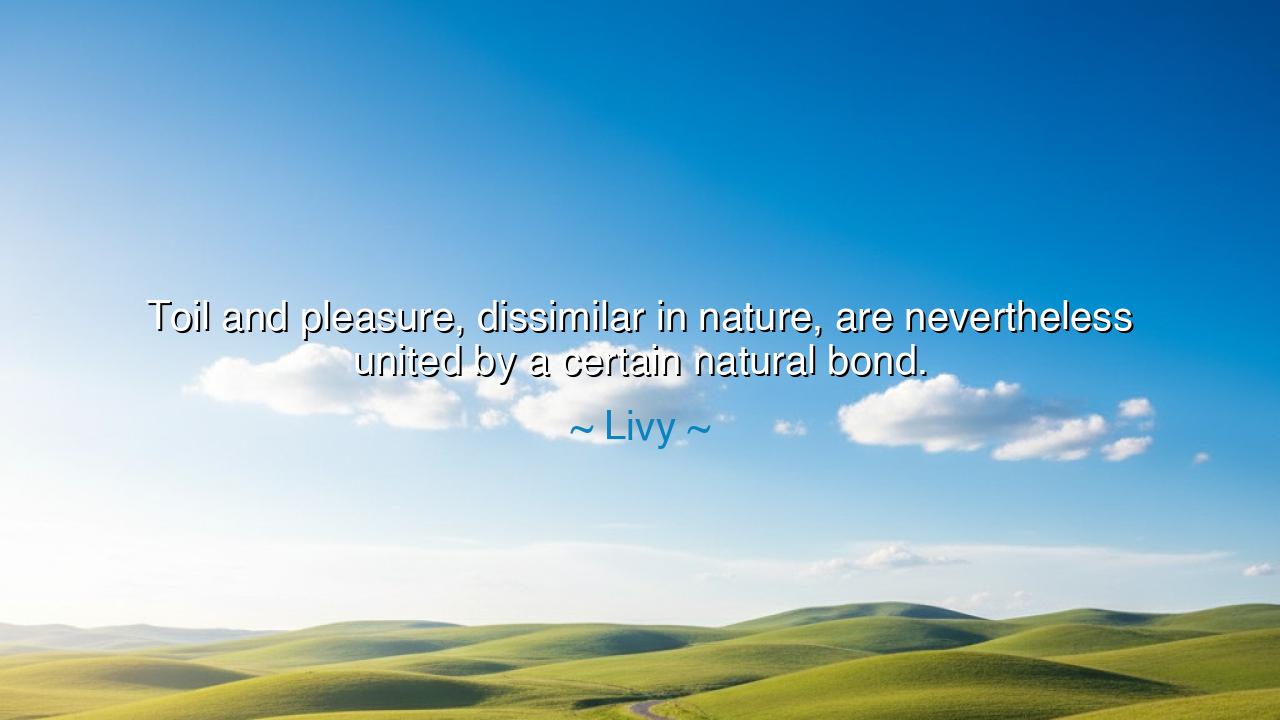
Toil and pleasure, dissimilar in nature, are nevertheless united
Toil and pleasure, dissimilar in nature, are nevertheless united by a certain natural bond.






Titus Livius, whom we call Livy, chronicler of Rome’s rise from humble shepherds to rulers of the world, once declared: “Toil and pleasure, dissimilar in nature, are nevertheless united by a certain natural bond.” At first, his words seem to carry a paradox. For how can toil, with its sweat, burden, and strain, be joined to pleasure, with its sweetness, joy, and ease? Yet in this paradox lies eternal wisdom: the two are not enemies but companions, bound together by the order of life itself.
Consider the farmer, bent under the weight of long labor in the fields. His back aches, his hands bleed, the sun scorches his brow. Yet when the harvest comes, and the grain fills the granaries, does not his heart swell with pleasure? And is not that pleasure made more profound by the memory of his toil? Without the sweat of the one, the sweetness of the other would never be known. Thus Livy speaks truth: labor and delight are not opposed, but linked in a sacred circle, each giving meaning to the other.
The ancients themselves bore witness to this law. Hercules, greatest of heroes, endured his twelve labors—tasks of monstrous difficulty and danger. Yet it was through those very labors that he won not only glory but immortality among the gods. His story reminds us that toil is the forge by which pleasure is purified into honor, and that the highest joys are not the fleeting kind, but those purchased through endurance and courage.
History, too, gives us examples of this bond. Consider Thomas Edison, who spent years in relentless experimentation, failing thousands of times before creating the electric light. His toil was ceaseless, yet the pleasure of finally bringing light into the homes of millions was magnified by every hour of struggle. Had the invention come easily, its sweetness would have been shallow. But because it was born from hardship, the triumph was eternal.
Livy, who wrote of Rome, saw this truth in the rise of his people. The Republic was forged in discipline, sacrifice, and the endless toil of soldiers, builders, and statesmen. Yet from that labor sprang the pleasure of civic pride, of festivals, of the arts and philosophy that flourished in Roman peace. He knew that empire without labor collapses into decadence, and labor without reward crushes the soul. But together—toil and pleasure—they form the natural rhythm of greatness.
The lesson for us, O seekers, is this: do not flee toil in search of only pleasure, nor despise pleasure as weakness when it comes after work. Embrace both, for they are woven into the same fabric of life. The bread you bake tastes sweeter when you kneaded the dough. The victory is greater when it is born of trial. And the rest at the end of labor is more profound than idleness without effort.
Practical wisdom follows. Choose endeavors that demand toil, but keep your eyes fixed on the pleasure they will bring—whether the joy of accomplishment, the relief of need, or the beauty of creation. When you labor, remind yourself that each drop of sweat is the seed of future delight. And when you enjoy your pleasures, remember the labor that made them possible, so that gratitude may temper indulgence. In this balance lies not only contentment, but virtue.
Thus Livy’s words endure across centuries: “Toil and pleasure, dissimilar in nature, are nevertheless united by a certain natural bond.” Let us hold fast to this truth. For life is not one or the other, but both together—labor and rest, struggle and joy, sorrow and celebration—bound by nature’s hand into the eternal rhythm by which the human soul is strengthened and fulfilled.






AAdministratorAdministrator
Welcome, honored guests. Please leave a comment, we will respond soon